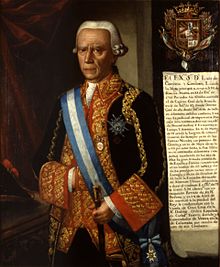Luis de Cordova
Luis de Córdova y Córdova , occasionally Louis or de Córdoba (born February 8, 1706 in Seville , Spain , † July 29, 1796 in Cádiz , Spain), was a Spanish admiral .
Luis entered the service of the Navy in 1721 and in 1730 he was in command of the escort that later became King Charles III. brought from Spain to Italy (Parma). During the War of the Polish Succession , he took part in those naval operations that contributed to the Spanish victory at Bitonte in 1734. In 1751 he sank the Algerian pirate ship Danzik off Cádiz , for which he was accepted into the Order of Calatrava .
Córdova did not advance to major general (or rear admiral) until 1773, to lieutenant general (or vice admiral) and commander of the squadron of Cadiz in 1774 or 1775. He only received decisive commands during the American War of Independence . In the meantime already 73 years old, in 1779 Córdova commanded a fleet of 30 or 36 ships of the line, which was to unite with as many French ships of the line in Brest for a landing in England, but was dispersed in storms on the way there. While the French fought mainly in the North Atlantic and the Caribbean, the focus of the sea war between the Spanish and the British shifted to the battle for Gibraltar . However, Córdova was unable to block the British Royal Navy in Gibraltar or to block the Strait of Gibraltar. Instead, he was successful in the privateer war and captured several ships from two British convoys in 1780. Thereupon Córdova was appointed commander-in-chief ( captain-general ) of the Spanish Navy and in 1781 again sent to the English Channel as commander-in-chief of a united Spanish-French fleet against England. Contrary to the advice and urging of the French Admiral de Guichen to attack and destroy the British canal fleet that had fled to Torbay , Córdova sailed back to Cádiz and left the canal to the Royal Navy without a fight. Despite a larger number of ships, he was unable to beat the British in a sea battle off Cape Spartel in October 1782 . It was not until 1791 that Córdova was retired from service because of his old age.
The naval historian Alexander Meurer attributed Córdova's failures mainly to "inability" due to aging; Córdova was "completely incapable" and "used up" for the naval war. (Obsolescence also affected the French navy: the highest French admiral d'Orvilliers was 70 years old at the beginning of the war, and de Guichen was also 65 - albeit considerably more agile than d'Orvilliers or Córdova.) Nevertheless, the city became Cordova in Alaska named after him in 1790.
Individual evidence
- ^ A b Joseph Droz: History of the government of Louis XVI. , Volume 1.Page 312f. Luden, Jena 1842
- ↑ a b c d e f Alexander Meurer : Maritime War History in Outlines , pages 287 and 298-302. Hase & Koehler, Leipzig 1943
- ↑ a b c d e f Real Academia de la Historia : Luis de Córdova y Córdova
- ^ A b c William Stewart: Admirals of the World - A Biographical Dictionary, 1500 to the Present , p. 75. McFarland, Jefferson 2009
- ↑ a b c Luis de Córdova . In: Universal Lexicon of the Present and Past . 4., reworked. and greatly increased edition, Volume 4: China – Deutsch-Krone , self-published, Altenburg 1858, p. 439f. .
| personal data | |
|---|---|
| SURNAME | Córdova, Luis de |
| ALTERNATIVE NAMES | Córdova y Córdova, Luis de (full name) |
| BRIEF DESCRIPTION | Spanish admiral |
| DATE OF BIRTH | February 8, 1706 |
| PLACE OF BIRTH | Seville , Spain |
| DATE OF DEATH | July 29, 1796 |
| Place of death | Cadiz , Spain |

